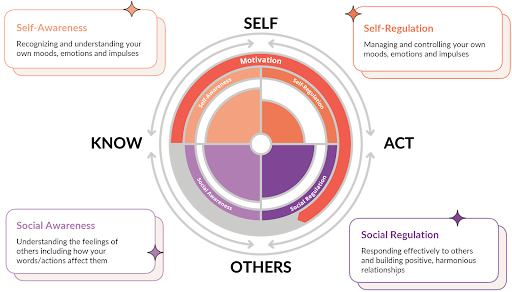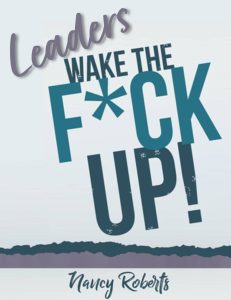First, it was Total Quality Management (TQM), then it was Change Management, followed by Leadership Development, Sustainability, and now Diversity, Equity, and Inclusion (DEI). These are just a few of the training and development “movements” that have swept through organizations since I started working in this field in the mid-90s.
Yet, there is one topic that seems to stand the test of time: Emotional Intelligence (EQ). While I was first introduced to Emotional Intelligence in the workplace almost 30 years ago (gulp!), it’s interesting to see that this year alone, I’ve been asked to speak on EQ five times, deliver EQ trainings for several executive leadership teams, and write a series of articles on the topic for a national trade magazine.
Why is there such a focus on EQ now? Is this a resurgence of Emotional Intelligence in the workplace, or are we just finally recognizing the value of what Daniel Goleman talked about in 1995 when he stated:
“Emotional intelligence accounts for more than two-thirds of the difference between star performers and average performers in ALL jobs.”
Given that Emotional Intelligence has been on our radar for decades, you might assume that we’d not only understand it but also know how to best develop it in ourselves and our employees. However, that’s often not the case!
There are several misconceptions about Emotional Intelligence in the workplace that hinder our ability to fully experience its transformative benefits.

Two Common Misconceptions About Emotional Intelligence in the Workplace
Many misconceptions surround Emotional Intelligence (EQ), which can lead to misunderstandings about its importance in professional development. Below are two of the most common misconceptions I encounter in my work with leaders and organizations.
1. “EQ is All About Self-Awareness”
One common misconception is that EQ only involves being self-aware. For example, in DISC trainings, leaders with dominant personalities often boast about how aggressive, bold, and impatient they can be when communicating with others. They believe that being aware of these traits means they have high Emotional Intelligence.
However, true Emotional Intelligence in the workplace goes beyond mere self-awareness. It’s not enough to understand your own personality traits; you also need to be aware of how your actions, words, and moods impact those around you. Without that understanding, self-awareness alone doesn’t equal high Emotional Intelligence.
2. “EQ Means Suppressing or Controlling Emotions”
Another misconception is that Emotional Intelligence in the workplace means suppressing or controlling emotions. I often encounter very stoic individuals who believe they have high EQ because they rarely, if ever, show emotion.
However, Emotional Intelligence isn’t about bottling up or ignoring emotions. Instead, it involves recognizing, understanding, and managing your emotions in a healthy and constructive way. Effective Emotional Intelligence allows you to handle emotions productively, rather than denying them. The goal is to respond to emotions in ways that benefit both yourself and the people around you.
Why Emotional Intelligence in the Workplace Matters Now More Than Ever
In today’s fast-paced and often stressful work environments, the ability to recognize and manage emotions is critical. Leaders with high Emotional Intelligence can improve team dynamics, boost productivity, and enhance communication. Employees who are emotionally intelligent tend to collaborate better, navigate workplace challenges more effectively, and contribute to a more positive organizational culture.
But beyond just benefiting teams and employees, Emotional Intelligence also plays a key role in business outcomes. According to research, companies with emotionally intelligent leaders and employees tend to outperform their peers in areas like employee retention, innovation, and overall business performance.
As organizations continue to focus on training programs like DEI and leadership development, the importance of Emotional Intelligence in the workplace is becoming increasingly clear. It is the foundational skill that allows other training initiatives to take root and flourish.
Start Your Emotional Intelligence Journey
If you’re ready to harness the power of Emotional Intelligence in your workplace, consider starting with the basics: recognize your triggers, understand how your emotions affect others, and learn to manage those emotions in constructive ways. Through developing EQ, you’ll be better equipped to handle the challenges of leadership, teamwork, and change in today’s ever-evolving business landscape.
As Daniel Goleman noted, Emotional Intelligence is the difference between average performers and star performers. So why not aim for the stars?
“It takes something more than intelligence to act intelligently.” ~ Fyodor Dostoyevsky
“It is very important to understand that emotional intelligence is not the opposite of intelligence, it is not the triumph of heart over head – it is the unique intersection of both.” ~ David Caruso
Boost Your Leadership with Our EQ Certification Program
Are you ready to master Emotional Intelligence in the workplace? Join our NEW EQ Certification Program, launching in 2025, to become the behavioral expert in your organization. This program equips you with the tools to understand people’s emotions and performance at a deeper level, allowing you to make more informed hiring decisions, improve employee engagement, and develop leaders.
Certification Program Details:
- Location: Woodcliff Hotel & Spa, Rochester, NY
- Day 1: DISC Certification
- Day 2: Motivators/Values Certification
- Day 3: EQ or TriMetrix Certification
You can also complete your certification online anytime at your convenience. Call 888-347-2949 or email info@discwizardonline.com for more details!






